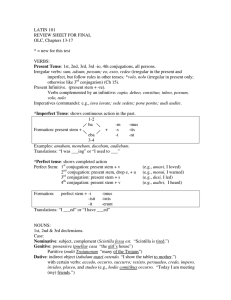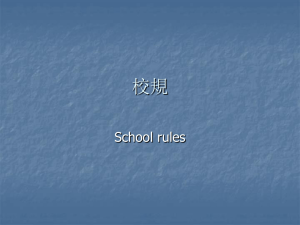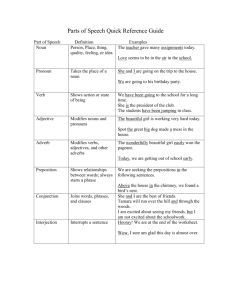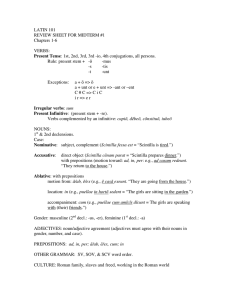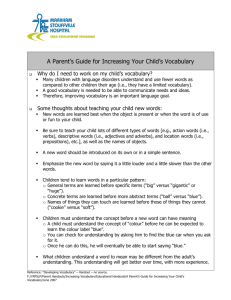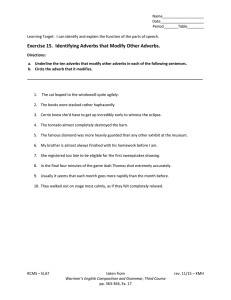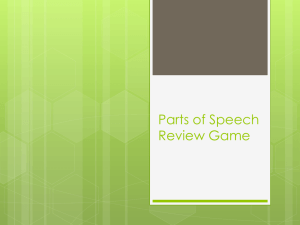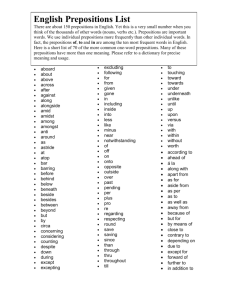LATIN 101 REVIEW SHEET FOR MIDTERM #2 Chapters 7-12
advertisement
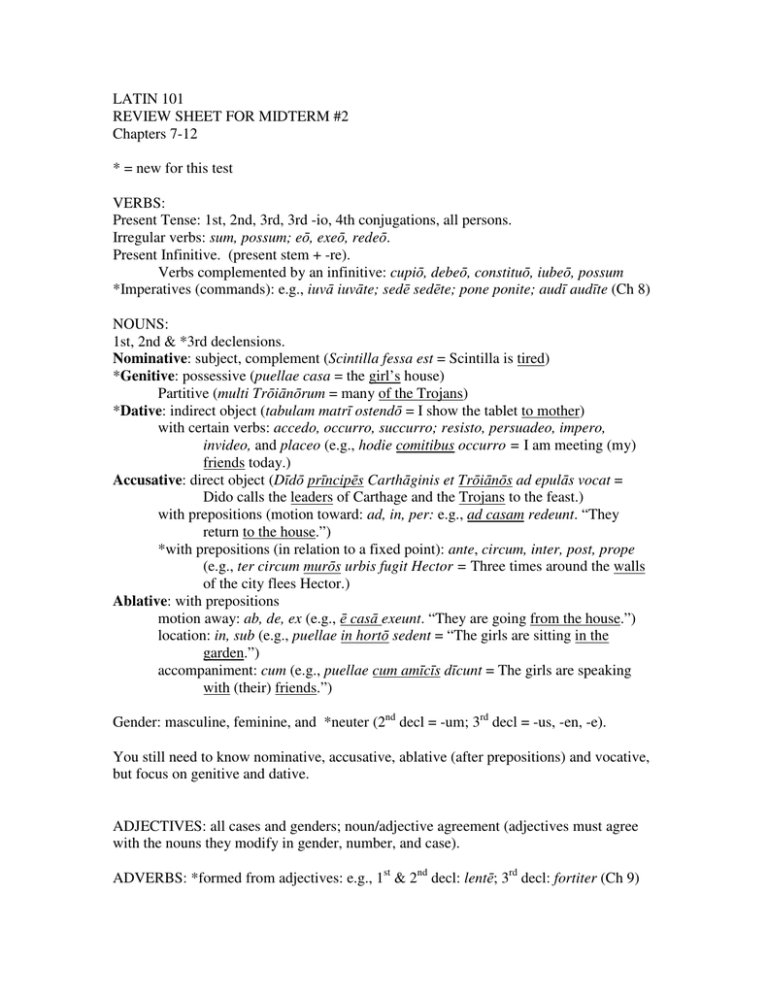
LATIN 101 REVIEW SHEET FOR MIDTERM #2 Chapters 7-12 * = new for this test VERBS: Present Tense: 1st, 2nd, 3rd, 3rd -io, 4th conjugations, all persons. Irregular verbs: sum, possum; eō, exeō, redeō. Present Infinitive. (present stem + -re). Verbs complemented by an infinitive: cupiō, debeō, constituō, iubeō, possum *Imperatives (commands): e.g., iuvā iuvāte; sedē sedēte; pone ponite; audī audīte (Ch 8) NOUNS: 1st, 2nd & *3rd declensions. Nominative: subject, complement (Scintilla fessa est = Scintilla is tired) *Genitive: possessive (puellae casa = the girl’s house) Partitive (multi Trōiānōrum = many of the Trojans) *Dative: indirect object (tabulam matrī ostendō = I show the tablet to mother) with certain verbs: accedo, occurro, succurro; resisto, persuadeo, impero, invideo, and placeo (e.g., hodie comitibus occurro = I am meeting (my) friends today.) Accusative: direct object (Dīdō prīncipēs Carthāginis et Trōiānōs ad epulās vocat = Dido calls the leaders of Carthage and the Trojans to the feast.) with prepositions (motion toward: ad, in, per: e.g., ad casam redeunt. “They return to the house.”) *with prepositions (in relation to a fixed point): ante, circum, inter, post, prope (e.g., ter circum murōs urbis fugit Hector = Three times around the walls of the city flees Hector.) Ablative: with prepositions motion away: ab, de, ex (e.g., ē casā exeunt. “They are going from the house.”) location: in, sub (e.g., puellae in hortō sedent = “The girls are sitting in the garden.”) accompaniment: cum (e.g., puellae cum amīcīs dīcunt = The girls are speaking with (their) friends.”) Gender: masculine, feminine, and *neuter (2nd decl = -um; 3rd decl = -us, -en, -e). You still need to know nominative, accusative, ablative (after prepositions) and vocative, but focus on genitive and dative. ADJECTIVES: all cases and genders; noun/adjective agreement (adjectives must agree with the nouns they modify in gender, number, and case). ADVERBS: *formed from adjectives: e.g., 1st & 2nd decl: lentē; 3rd decl: fortiter (Ch 9) PREPOSITIONS: ad, in, per; ante, circum, inter, post, prope; ā/ab, ē/ex, cum; in, sub SYNTAX: SV, SOV, & SVC word order. *-que (just need to recognize it). (Ch 8) CULTURE: Roman education, Trojan War, Adventures of Aeneas, Roman women VOCABULARY FOR MIDTERM #2 NOUNS: 1st fem: aqua, casa, cena, dea, fabula, fama, familia, femina, filia, hasta, ianua, insula, ira, littera, patria, porta, puella, pugna, regina, silva, terra, unda, via 1st masc: nauta 2nd masc: ager, amicus, animus, cibus, colonus, deus, equus, filius, hortus, ludus, magister, maritus, murus, nuntius, oculus, puer, somnus, ventus, vir 2nd neut: arma (n. pl.), bellum, caelum, castra (n. pl.), consilium, imperium, periculum, saxum, templum, verbum, vinum, 3rd masc: amor, clamor, frater, labor, pater, princeps, rex fem: arbor, hiems, mater, uxor common: canis, comes, homo neut: flumen, litus, nomen, tempus 3rd i-stem masc: (gen pl = -ium) collis, hostis, mons fem: (gen pl = -ium) mors, navis, nox, urbs neut: (abl sg = -i; nom & acc pl = -ia; gen pl = -ium) mare ADJECTIVES: 1st and 2nd decl: alius, anxius, bonus, carus, ceteri (pl. only), commotus, fessus, ignotus, iratus, laetus, magnus, malus, meus, miser, mortuus, multus, noster, notus, novus, paratus, parvus, pauci (pl. only), primus, solus, suus, tacitus, territus, tantus, totus, tuus, vester 3rd decl i-stem: (abl sg = -i; gen pl = -ium; nom & acc neut pl = -ia) fortis, incolumis, omnis, tristis 3rd decl: (1 ending) felix, infelix, ingens (i.e. ingens unda, ingens equus, ingens saxum vs misera puella, miser puer, miserum verbum) PRONOUNS: ego & tu (focus on nom, acc, & dat, sing. & pl); ille illa illud (nom. only); is ea id (acc. eos, eas, ea) VERBS: (plus compound verbs) 1st: aedifico, ambulo, amo, ceno, clamo, curo, despero, do, erro, exspecto, festino, habito, impero, intro, iuvo, laboro, laudo, narro, navigo, oppugno, oro, paro, porto, pugno, rogo, saluto, servo, specto, sto, voco 2nd: debeo, doceo, gaudeo, habeo, iaceo, iubeo, maneo, moneo, placeo, respondeo, sedeo, taceo, timeo, video 3rd: accedo, ascendo, bibo, cado, cognosco, constituo, curro, defendo, dico, duco, emo, ludo, mitto, occido, occurro, ostendo, peto, pono, procedo, quaero, quiesco, reddo, resisto, relinquo, scribo, succurro, surgo, tollo, trado, verto, vinco 3rd -io: accipio, capio, conicio, cupio, facio, fugio, iacio 4th: advenio, audio, convenio, dormio, invenio, venio irregular: adsum, possum, sum; adeo, eo, exeo, redeo; (fero); inquit (just 3rd sing & pl) ADVERBS: (spatial) hic, huc, ibi ADVERBS: (temporal) diu, hodie, iam, interea, iterum, lente, mox, nunc, saepe, semper, statim, subito ADVERBS: (temporal and logical) deinde, etiam, itaque, primum, tandem ADVERBS: (manner) ita, sic ADVERBS: (negation) non, vix PREPOSITIONS: (accusative) ad, in, per; ante, circum, inter, post, prope PREPOSITIONS: (ablative) a/ab, de, e/ex; in, sub; cum CONJUNCTIONS: (coordinating) aut...aut, et, itaque, nam, nec…nec/neque…neque, que, sed INTERROGATIVES: cur, qualis, quantus, quomodo, ubi, nonne, -ne Nom. Gen. Dat. Acc. quis (who?) cuius (whose?) cui (to/for whom?) quem (whom?) quid (what?) quid (what?)
